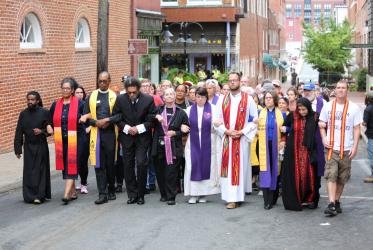Rev. Gloria Ulloa Alvarado, WCC president for Latin America and the Caribbean, served as moderator for the discussion, reflecting that the stories are loaded with pain and suffering yet many have been forgotten. “And we want this event to be a conversation,” she urged. “We will be focusing both on the colonial and post-colonial times, and we will be sharing rich experiences of resilience.”
Sarah Sanchez, a laywoman and member of the Missionary Indigenous Council, is a Mexican national who lives in Brazil. She shared a bit of the pain and suffering that has been caused oftentimes by the Catholic church to indigenous peoples. “Our story is marked by this sin and we have been complacent of these massacres committed against the native peoples,” she said. “I am now speaking about the Brazilian context specifically.”
In most American territories, she said, there was the cross and the sword. “Many times, our brothers and sisters in Latin America were destroyed,” she said.
Dr Betty Ruth Lozano Lerma, spoke about the transatlantic trafficking of slaves. “There are massacres in the past that continue to today, and we want to remember one of the greatest massacres in human history which is the Black trafficking, which is basically the uprooting of Africans requested from the west African countries by Portuguese merchants and also by the great majority of European countries,” she said. “Fifty million people were lost in the 400 years of slavery.”
Many were killed or died during the transport, she added. “It is said the Atlantic sea is one of the biggest graveyards in history,” she said.
Nobel Peace Laureate Adolfo Perez Esquivel spoke on the military dictatorships in the south of Latin America up to the 1980s. “The colonizers took everything and left us with nothing,” he said. “Dictatorships are the fruit of imposed politics. This also has to do with the western-eastern conflict in the world after the Second World War.”
Prof. Dr Jessica Byron-Reid, a member of the WCC Commission of the Churches on International Affairs from Trinidad and Tobago, spoke about massacres in Haiti and the Dominican Republic in 1937.
“Bodies were burned or buried in unmarked graves,” she said. “Many of these have never been found.”
Panelists also reflected on resiliency and how churches have helped bring resilience about. “We will be ending on a positive note to celebrate the work that some churches have carried out in support of this resilience and in their efforts for healing the past wounds and fighting for a just and fair society,” said moderator Alvarado.
The event was part of a series of regional webinars organised by the World Council of Churches (WCC) Commission of the Churches on International Affairs in collaboration with WCC Spiritual Life. It is among many virtual events organised this year to mark the 75th anniversary of the WCC Commission of the Churches on International Affairs.






